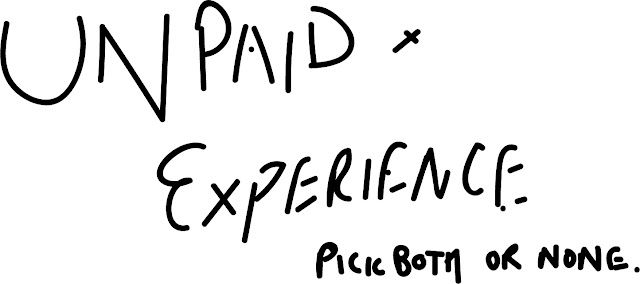"But my dear, it's not always about the money"
 |
I'm sure many avid Dezeen readers, architecture colleagues and my friends are aware of the hot topic that has exploded recently. After the news of Junya Ishigami's recently commissioned Serpentine Pavilion, where he is obligated to pay those who are involved with the project due to his unpaid internships. The news was immediately followed by another article condemning firms that provide unpaid internship shouldn't be commissioned by high profile galleries.
This feels too much like a laughing matter really, considering this topic has been a tedious debate and conversation, and sometimes it feels too much about a debate of cultures and reputation that has continued to drag this topic into the long haul.
"if you're here for the experience, that should be more rewarding with money, right? "
I've had many conversations with my friends and lecturer about unpaid internships - or worse, underpaying interns by giving them a complete different job description. On most occasion, my friends and I express our frustration at how companies are excellent at exploiting two things: their name in the network and the commercial sphere (we've already had an infamous case where one firm decides to exploit student's desperation and underpay by giving them a different job title), or the fear of interns who does not want to give the false impression that they come to work purely for money - another way of putting it - if you're here for the experience, that should be more rewarding with money, right? Sometimes, I feel that these exploits are the least of anybody's worries - at the end of the day, it is about the 'reputation' one needs to maintain.
The word reputation itself carries a lot of weight on many individuals. It is also a reflection of human nature in the way we perceive on another based on their actions. We've all heard the something that goes along the lines of "when a good person does something bad, we remember only that bad thing they've done, yet for a bad person, our image can drastically shift should they do something good". While this saying can be an elephant in this entry I am writing right now, I am aware that there are many who overlook the pro's and cons' and still work under a company despite their reputation being frowned upon on. Why? At the end of the day, their name and image is already large and feared eough that it will take a lengthy time to dismantle.
"it is fine because at the end of the day I have gained far more experience than others"
Personally, I've had my fair share of those naive thoughts as well. My infamous ones include being paid the absolute minimum for working in a biology lab and fashion headquarters - which my teachers were very annoyed about (considering the cost couldn't cover my transportation fee). Another situation was being paid the same amount as my intern who was there half the time I was. There were many moments where I was stubbornly console myself it is fine because at the end of the day I have gained far more experience than others. Realistically speaking however, the real world can work like that. We have already witnessed countless headlines of chefs being underpaid, Seven-Eleven workers underpaid and international students poorly underpaid. The underpay and unpaid issue is slowly being brought to light.
Looking back at the experiences I've gathered so far I still question whether sometimes it is acceptable to carry the thought of quality over money. As Sou Fujimoto defended his country's culture of unpaid internship, arguing that it provided ample opportunities for firms to be able to hire interns as a way of learning from the thoughts of the future in return of lending their reputation and knowledge. There is some logic to this - considering I did guiltily admit that I almost applied for an unpaid internship in Japan. However, at the end of the day - how much of myself am I willing to give when I don't have any personal support nor financial stability in another country? Having said though, one of my friends whom I met while I was on a study tour in Japan stated that her unpaid internship (lunch provided) with an architecture firm she has always admired was remembered fondly - working in another environment and being exposed to another culture that is extremely meticulous gave her another angle that has prepared her well for the future ahead. Sometimes - it really comes down to one's perseverance and endurance, and dare I say, whether you are willing to treat your 'experience' as your choice of payment.
"To pay or not to pay" - the comment hangs heavily in the air lately. This topic, while I am happy that it is brought into the light, I am still disappointed that it is yet to be widely discussed at universities. Following the article headlining designer Karim Rashid's statement "unpaid internships are better value than exploiting university courses", I am at odds with the statement. As a big supporter for education rights and education structures, I have to argue that realistically, no matter where you go - the value of what you learn can only be measured by how much you are willing to learn, assess and grow from. Of course, education facilities are there to help structure and guide your thinking about architecture, etc. - nothing will prepare you until you are willing to put your own pride aside and learn to adapt and think critically as you go. I can confidently say this after opening a can of worms with the Institute of Architecture's Education board meeting (yes I know, I have talked about this moment to death). My question of challenging reasons why students from interior architecture department are required to do work experience to graduate when architecture students don't was immediately dismissed by the teaching staff's worries of our disillusion when working in a real firm. I couldn't help but feel a wave of disappointment at the excuse - at some point, we all have to realise the realities of work. Although, I do wonder if our education was sheltering us otherwise asking us to become more independent should we be thrown into the real world.
There are so many arguments on whether internships should be paid or not. Ultimately, at the end of the day - the debate of whether unpaid internship is a worthwhile quality will depend on the pros and cons one will weigh up to. Depending on the individual's situation, ambition and their endurance that can decide whether they are up for it or not. However, if I were to tell my younger self - so long as you do not feel exploited and understand where your goals are then it is okay, stay strong and don't be swayed by other people's arguments about being paid - otherwise you'll just be tainting your own experiences that you once enjoyed.
In response to:
- "Unpaid architecture internships in Japan are a "nice opportunity" says Sou Fujimoto"
- "Karim Rashid says unpaid internships are better value than "exploiting" university courses"
- "Elemental ends internships amid growing row over unpaid work in architecture studios"
- "Serpentine Gallery tells Junya Ishigami to pay all staff working on this year's pavilion"
- "Architects who don't pay interns "shouldn't be given prestigious commissions" says designer who revealed Ishigami internships"
- "No interns should work unpaid"
- What is the proper job description without being misleading? See comments
- "George Calombaris' Hellenic Republic restaurant hit by underpayment claims"
- "From $6 an hour wages to sleeping in car parks, international students endure it all"
- "7-Eleven worker paid as little as 47 cents an hour, lawyers say"





Comments
Post a Comment